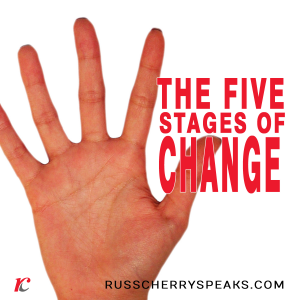There’s a saying I love: Change is inevitable…except from a vending machine.
Some people adore change. They thrive in it. The status quo is the worst thing they can think of. But for most of us, change can be a challenge that almost always results in some kind of physical, mental, or emotional distress.
All of us have a body part or mental process that suffers under stress. Is your back killing you? How about your knee? Migraines anyone? Not only do we feel physical symptoms but we also suffer emotionally and mentally. Ever have a hard time getting out of bed for more than a week? Clinically, that’s diagnosed as low grade depression.
Usually, we can work our way through these symptoms, but here’s a crazy fact: it can take up to 18 months to work through serious forms of change. Marriage, divorce, birth of a child, loss of a loved one, moving, moving offices, moving cube mates, even positive changes like new office furniture or a promotion can significantly impact our mental/emotional/physical state.
And in reality, as an adult you usually have to deal with 6 to 8 significant emotional events all at the same time. You might be saying to yourself, “I don’t have time for this. I just got through one massive change and I can’t get my brain around it–let alone the next one.”
Now combine how you’re feeling with the changes your work team or family members are also facing. It’s staggering to think of all the feelings, worry and stress that is swirling around you.
So what do you to keep moving forward personally and as an organization? One of the first things I recommend to those I work with is to recognize the 5 Stages of Change and learn to work through them.

SHOCK: “Unbelievable!”
Just when you get through one change you have to deal with another. Even when you may be anticipating a change, working through one after another may make you feel surprised and overwhelmed.
ANGER: “Burns me up!”
Nobody likes or looks for change, and having some level of anger (whether or that’s what you call it) is natural. Don’t try to fix angry people–just allow them to work through their feelings in a calm and safe way.
BARGAIN: “If…then…”
What do we bargain for? The good old days, when you knew what to expect and when to expect it. But those days aren’t coming back and we must help ourselves and our people go on. Another thing to ponder? The good old days rarely were the idyllic situation you may remember. Odds are, change was always happening. It’s just a little tough to remember it in the midst of new changes.
DEPRESSION: “I just feel sad.”
When you change, you give up one situation for another. Feeling a sense of loss is natural–and all loss must be mourned in one way or another. Allowing mourning to happen with ultimately help people let things go in a more positive and long-term way.
ACCEPTANCE: “Okay, fine!”
Acceptance often takes two forms: first intellectual (“I know this change is necessary and will lead to good things”) then emotional (“I’m still feeling unsure, but I’m going to be okay.”) Achieving acceptance is a sign of good mental health and coping skills.
By understanding the 5 Stages of Change and learning to work through them, you and those you lead will be better able to adapt to change and potentially even thrive in the midst of it.
The post The 5 Stages of Change appeared first on Russ Cherry, Speaker & Consultant.
Source: Russ Cherry Speaks
